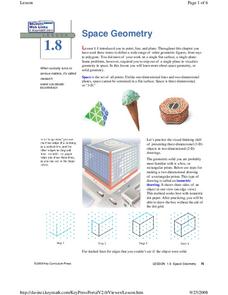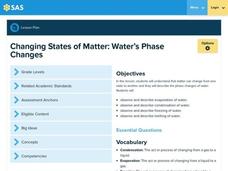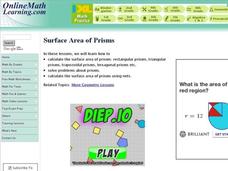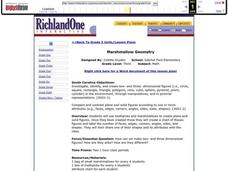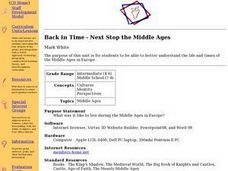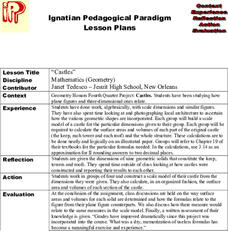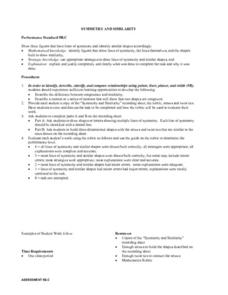Curated OER
Color Me Square
Second graders identify and describe basic geometric solids. Working as a class, 2nd graders describe geometric solids using the proper vocabulary and counting faces, bases, corners, and edges. In pairs, students use a computer drawing...
Curated OER
Space Geometry
Students explore points, lines and planes as it relates to geometry. In this geometry lesson, students analyze space and explain wy it is 3-D and not flat or 2-D. They solve problems involving volume and 3-D shapes.
Curated OER
Clothing and Social Change in America
Students examine how clothing for men and women has changed over time with their changing roles in society. Students work individually and in groups to complete the tasks in this lesson.
Curated OER
Miriam Schapiro Action Figures Collage
Students create a background with a marbling technique. They plan and create a figure from assorted papers, mixing solids and patterns. Students glue the figure to the background, and embellish negative space with glitter.
Curated OER
Geometry and Tony Smith Sculpture
Students respond to Tony Smith's sculpture as art and brainstorm about math concepts inherent in his work. They create a sculpture with polyhedra nets, calculate the cost of covering sculpture in gold, and write an exhibit label for...
Pennsylvania Department of Education
Changing States of Matter: Water’s Phase Changes
Third graders observe the properties of water and in its different states. For this states of matter lesson, 3rd graders view a video, read The Magic School Bus at the Waterworks and experiment with freezing, melting and boiling water to...
Curated OER
Surface Area of Prism
Tenth graders are provided instructions, including a video, on calculating the surface area of a prism. The one-page interactive worksheet contains two worked questions. Answers are included.
Curated OER
Ruler and Compass Constructions
Fourth and fifth graders examine how to construct perpendicular lines and to bisect angles using rulers and compasses in this unit of lessons. They design a number of polygons using these methods.
Curated OER
2D Polygons and 3D Nets
Students compare and contrast two dimensional polygons and three dimentional nets by examining the differences in drawings. They create three dimensional shapes and label the faces, edges, and vertices. After creating the shapes, they...
Curated OER
Marshmallow Geometry
Third graders create 2D and 3D shapes using marshmallows and toothpicks. In this geometry lesson, 3rd graders create their shapes and document the number of faces, edges, corners, angles, and sides. They share one shape and its...
Curated OER
Area, Perimeter Word Puzzle
Students measure planes and solids. In this geometry lesson, students find the area and perimeter of different polygons.They complete a word puzzle to review their vocabulary words.
Curated OER
Bubbles Everywhere!
Eighth graders use concrete and graphic models to derive formulas for finding perimeter, area, surface area, circumference, and volume of two- and three-dimensional shapes. This lesson is a fun way to practice measurement and circle and...
Curated OER
Surface Area of Prisms
Students calculate the surface area of different prisms. For this geometry lesson, students identify the shapes of solids based on the properties of that solid. They calculate the surface area using nets and properties of prisms.
Curated OER
The Civil War in Art and Literature
Students examine art related to the Civil War. They participate in activities that allow them to write poetry and drawings. They create their own journal and collect their work in a binder.
Curated OER
Back in Time - Next Stop the Middle Ages
Students are introduced to the Middle Ages through Powerpoint presentations and books. During the presentations students work on various reading skills by reading made up papers about the Middle Ages detailing certain events in history.
Curated OER
Castles
Students create a scale model to a castle using the dimensions they were given. They calculate the surface areas and volumes of each section of their castle.
Curated OER
Math: Shapes and More Shapes
Students locate lines of symmetry in regular polygons and predict the number of lines of symmetry in an octagon. In three different polygons, they construct all lines of symmetry and after making their prediction about the octagon,...
Curated OER
Investigating: Finding the Volume
Sixth graders explore geometry by utilizing colored cubes in class. In this volume lesson, 6th graders identify the different shapes they can create using their colored cubes and identify the formula for finding volume. Students create...
Curated OER
Polyhedra Book
In this math activity, learners are asked to read the book that focuses upon the creation and explanation of three dimensional shapes.
Curated OER
Math: Symmetry and Similarity
Students describe the differences between congruence and similarity. After explaining the motions that indicate congruency of two shapes, they complete worksheets to draw lines of symmetry and similar shapes. With straws and twist...
Curated OER
Cut It Out!
Young scholars calculate the surface area of polygons. For this geometry lesson, students use spacial reasoning to find the answer to their problem. They analyze solids and create formulas to estimate the measurements of the area.
Curated OER
Liquids in Bottles
Students investigate different liquids to develop their concept of a liquid. They work at a center to tip, swirl, shake, roll, and otherwise investigate seven liquids in small, clear plastic bottles: plain water, corn syrup, liquid...
Curated OER
Physical Changes and States of Matter- Two
Third graders explore the concept of evaporation as they observe how the water level changes in a cup that is left out. Working in groups they observe physical changes in a group of everyday items. They record the changes in shape, size,...
Curated OER
Euler Characteristic
Students identify the different properties of Euler's Characteristics. In this geometry instructional activity, students identify the shape and surface a polygon. They relate the concept of Euler to solving real world problems.



